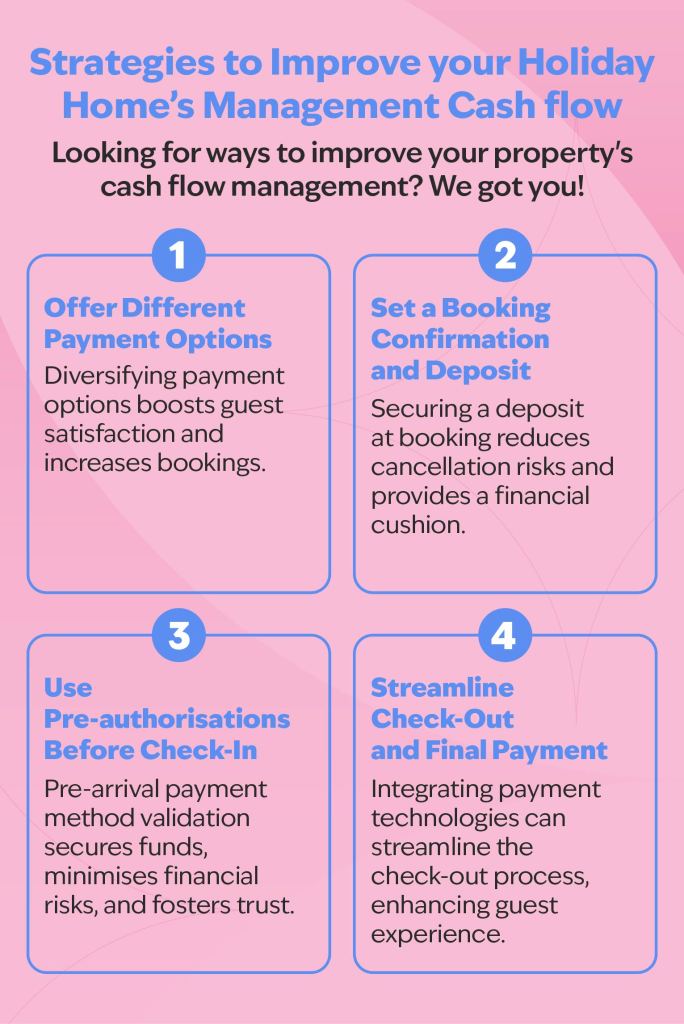
How to manage the cash flow of your holiday home? That’s a question you probably have asked yourself in multiple occasions. In the hospitality industry, proficiently managing this is fundamental to maintaining the financial health and operational success of your holiday rental property. But you might wonder, what exactly is cash flow? And why is it important for your holiday home finance and personal income? Dive into this insightful article, where we tell you all about it. With expert advice and practical tips, we’re here to help you boost your rental income even in off-peak seasons. Let’s begin!
- What Is Cash flow?
- Optimising Revenue: Payment Strategies to Improve your Holiday Home’s Cash flow
- Mastering Payment Methods: Automation for your Hotel's Cash flow Strategy
- Tackling Common Cash flow Problems for Holiday Homes
- Securing Success: Advanced Cash flow Management for Your Holiday Let
- Cash flow For Your Holiday Let: FAQs
What Is Cash flow?
So first things first: Cash flow is the total amount of money being transferred into and out of a business. In the hospitality context, particularly for holiday homes, it involves managing the income from guests and expenses related to property upkeep, staff, marketing, and more. It has its unique characteristics: from seasonal variability to the unpredictability of guest behaviour. Effective cash flow management ensures that your holiday let remains solvent and profitable all year round, capable of navigating peak seasons and slower periods with financial stability and improving your annual income.
Did you miss our webinar on Secure & Streamlined Cash flow for your Holiday Home? Watch it here!
Optimising Revenue: Payment Strategies to Improve your Holiday Home’s Cash flow
There are some methods you can use to increase the profits of your holiday rental and make your management more efficient.

1. Payment Options Before Booking
Every guest’s journey begins with a booking, so offering diverse payment is great to not only enrich the guest experience but also accelerate your cash inflow. Whether through traditional credit cards, online portals, or mobile payments, flexibility in payment options caters to the varying preferences of your guests, potentially increasing booking rates. Integrating innovative payment solutions, such as digital wallets or cryptocurrencies, can further enhance accessibility and convenience, making your services more attractive to a broader audience. This adaptability not only positions you as a forward-thinking player in the hospitality industry but also aligns your business with evolving technological trends, setting a foundation for future growth and customer satisfaction.
2. Booking Confirmation and Deposit
Securing a deposit at the time of booking mitigates the risks of cancellations and no-shows, but also builds a trust-based relationship with your guests, emphasizing their responsibility towards their reservation. This practice also allows for better financial planning and resource allocation, as it provides a more predictable revenue model, enabling businesses to optimise their services and operational efficiency. Furthermore, deposits can act as a financial cushion, helping to stabilize the business against unexpected fluctuations in guest attendance or market conditions.
3. Pre-arrival and Check-In
The pre-arrival phase involves ensuring your guest’s payment method is valid through pre-authorization. This step guarantees that the funds for their stay are reserved, balancing the need for financial security. By verifying payment methods in advance, you can minimise the risk of financial loss of your holiday let due to fraudulent transactions or declined payments. Moreover, this proactive approach fosters trust and reliability, assuring guests that their bookings are secure and well-managed, which can significantly enhance their perception of the property management service and potentially influence their decision to become repeat customers.
4. Streamlining Check-Out and Final Payment
The check-out process should be seamless, providing your guests with flexible payment options, thereby enhancing their overall experience and indirectly encouraging repeat business. By integrating advanced payment technologies, you can offer a hassle-free and efficient check-out experience, reducing wait times and improving customer satisfaction. Additionally, clear communication about payment processes and options can further streamline their experience, leaving a lasting positive impression that drives loyalty and promotes your property through word-of-mouth recommendations.
Mastering Payment Methods: Automation for your Hotel’s Cash flow Strategy
By implementing automation in your payment systems, you not only streamline the financial operations but also provide a more consistent and reliable payment experience for your guests. This technology reduces human error, ensures timely payments, and supports data analysis for better financial planning. Furthermore, automation facilitates a quicker response to market changes, enabling you to adapt your pricing strategies dynamically, thus maximizing revenue opportunities. Here are the overall benefits of implementing automation in your cash flow management:
✅ Enhances operational efficiency by reducing manual processing and potential errors
✅ Accelerates revenue with swift transaction processing and instant invoicing
✅ Improves customer satisfaction by offering a seamless and reliable payment experience
✅ Enables data-driven decision-making through detailed financial analytics and reporting
✅ Facilitates dynamic pricing strategies and quick adaptation to market changes
Tackling Common Cash flow Problems for Holiday Homes
No-shows, cancellations, and fraud can severely disrupt the earnings of your holiday let. Implementing these benefits can help you out in order to acquire a healthy cash flow during peak season.
👉 Optimise rental income by minimizing revenue loss from no-shows and cancellations with robust deposit policies.
👉 Enhance hotel cash flow stability by using secure, technology-driven payment systems to prevent fraud and ensure timely revenue collection.
👉 Increase the likelihood of bookings and guest satisfaction by providing a variety of payment options, catering to different guest preferences and improving overall cash flow.
Streamlining the cash flow management of your holiday home is not just about financial health; it’s about enhancing guest experiences, cut costs, securing revenue, and optimizing operational practices. With the right cash flow management strategies and tools, you can not only safeguard your investments but also unlock new opportunities for growth and success of your holiday property.
Securing Success: Advanced Cash flow Management for Your Holiday Let
In the fast-paced world of holiday home rentals, mastering cash flow management is pivotal to ensuring the financial health and operational efficiency of your property. By embracing diverse payment options, securing deposits, and leveraging automation, you can optimise your rental income, mitigate risks, and enhance guest experiences. This guide has armed you with the knowledge and strategies to navigate the complexities of cash flow in the hospitality industry, setting a solid foundation for your holiday let’s success. Remember, a robust management system not only secures your financial stability but also propels your holiday business, towards sustainable growth and heightened guest satisfaction.
Cash flow For Your Holiday Let: FAQs
1. What is the 10-year rule for holiday lets?
The 10-year rule traditionally refers to the condition under which a holiday let business must be furnished and available for holiday letting to the public for at least 210 days in the tax year. It’s crucial for tax relief and benefits eligibility.
2. What is the best way to finance a holiday home?
Financing a holiday home can vary based on personal circumstances, but options include leveraging a holiday home mortgage, refinancing an existing property, or exploring holiday let specific loans. Consulting with a mortgage broker can provide tailored advice.
3. How can I make my holiday home profitable?
To generate income and enhance profitability, focus on maximizing occupancy through strategic pricing, exceptional guest experiences, and effective marketing to attract guests. Additionally, managing operational costs and exploring various revenue streams, such as offering add-on services, can significantly impact profitability.
4. What are the new rules for holiday lets in 2023?
The new rules may vary by location but generally include stricter regulations on minimum letting periods, increased safety and compliance requirements, and potential changes in tax rules. It’s important to stay informed and adjust your operational strategies accordingly.
5. What is the rental income?
Rental income is the money earned by a property owner from leasing out a business, such as a house, flat, or commercial space, to a tenant. It serves as a steady source of revenue and can contribute to the owner’s cash flow, interest rate and investment returns.